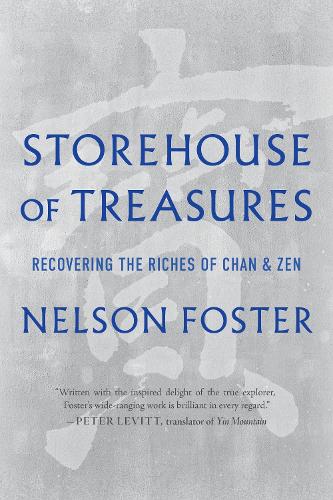
Storehouse of Treasures: Recovering the Riches of Chan and Zen
(Paperback)
Publishing Details
Storehouse of Treasures: Recovering the Riches of Chan and Zen
By (Author) Nelson Foster
Shambhala Publications Inc
Shambhala Publications Inc
8th October 2024
2nd September 2024
United States
Classifications
General
Non Fiction
294.3927
Physical Properties
Paperback
320
Width 152mm, Height 229mm
Description
Since the dawn of Chan and Zen in medieval China and Japan, members of these schools have enlivened their teaching by creatively adopting and adapting terms, images, principles, poetry, and lore native to their societies. Unfortunately, so much of that cultural wealth has been "lost in translation" that Western practitioners have barely begun to discover and appreciate this extraordinarily rich legacy. In Storehouse of Treasures, second-generation American Zen teacher Nelson Foster makes a series of adventuresome forays into the trove of material laid up by the Dharma ancestors, bringing to light- Masters' delight in playing with words, stories, and inherited Buddhist concepts, bending them to express the Dharma in inspired ways The powerful influence that Taoist and Confucian thought exerted in the formation of Chan and Zen The emphasis the two schools have laid on excellence of character as well as on profound awakening The experiential meaning and enduring importance to the tradition of ideals little associated with it today, like integrity, shame, and contentment How "knowing the tune" of a fellow student, a mentor, or a teacher of old lies at the heart of transmitting the Dharma Lifting to attention a diverse set of ancient yet still luminous Dharma gems, Foster urges their relevance and value to us as students of the Buddha Way and as citizens of a world increasingly fractious and imperiled. Storehouse of Treasures unearths wise and beautiful elements of Chan and Zen still little known in the West, revealing unexpected aspects of the tradition and new implications for practice. Since the dawn of Chan and Zen in medieval China and Japan, members of these schools have enlivened their teaching by creatively adopting and adapting terms, images, principles, poetry, and lore native to their societies. Unfortunately, so much of that cultural wealth has been "lost in translation" that Western practitioners have barely begun to discover and appreciate this extraordinarily rich legacy. In Storehouse of Treasures, second-generation American Zen teacher Nelson Foster makes a series of adventuresome forays into the trove of material laid up by the Dharma ancestors, bringing to light- Masters' delight in playing with words, stories, and inherited Buddhist concepts, bending them to express the Dharma in inspired ways The powerful influence that Taoist and Confucian thought exerted in the formation of Chan and Zen The emphasis the two schools have laid on excellence of character as well as on profound awakening The experiential meaning and enduring importance to the tradition of ideals little associated with it today, like integrity, shame, and contentment How "knowing the tune" of a fellow student, a mentor, or a teacher of old lies at the heart of transmitting the Dharma Lifting to attention a diverse set of ancient yet still luminous Dharma gems, Foster urges their relevance and value to us as students of the Buddha Way and as citizens of a world increasingly fractious and imperiled.
Reviews
A rare combination of wide learning, wise counsel, and warm humanity, Fosters book represents a fascinating exploration of the contemporary value of the ancient Zen lore. Truly a storehouse of treasures.
Carl Bielefeldt, author of Dgens Manuals of Zen Meditation
This book is itself a storehouse of little-known treasures. Thanks and a deep bow to Nelson Foster for bringing forth these ownerless riches for our benefit.
David R. Loy, author of Ecodharma: Buddhist Teachings for the Ecological Crisis
Written with the inspired delight of the true explorer, Fosters wide-ranging work is brilliant in every regard. His thoughtful, thoroughly researched, and poetic tracing is a treasure that puts in our hands the historical roots of Chan and Zen. Insightful, important, and engaging from beginning to end.
Peter Levitt, translator of Yin Mountain: The Immortal Poetry of Three Daoist Women
This delightful and erudite work fills a lacuna in modern, English-language Chan/Zen literature. Nelson Foster has kindly offered Zen practitioners not so much explicit instructions on practice or better translations of Zen stories but insights on Chan expressions and implicit values that permeate much of the cultural foundation of Chan practice. Without these revelations, practitioners of the modern West may not grasp the subtle wisdom of our premodern Chan forebears. Reading this book provides a good introduction to truly appreciate the world of Chan.
Guo Gu, author of Silent Illumination: A Chan Buddhist Path to Natural Awakening
Beginning with a leisurely journey exploring connections between key Daoist terms such as wuwei to Chan and Zen, Nelson Fosters new book is learned, companionable, and full of quiet delights. In its conclusion, however, these hidden streams open to the ocean and the uncharted transit from birth to death.
Mushim Patricia Ikeda, Buddhist teacher and community activist
Author Bio
NELSON FOSTER began Zen practice under Diamond Sangha founder Robert Aitken in 1972, later becoming his Dharma heir and succeeding him at its Honolulu temple. Today he teaches in this lay lineage mainly at Ring of Bone Zendo in the Sierra Nevada foothills, while also serving East Rock Sangha in New England and making periodic visits to sanghas in Hawai'i. Among his Buddhist publications, the best known is the much-praised anthology The Roaring Stream- A New Zen Reader.
